World
Out in the World: LGBTQ news from Europe and Asia
Social media under pressure after a queer teenager’s died by suicide in India

Romania
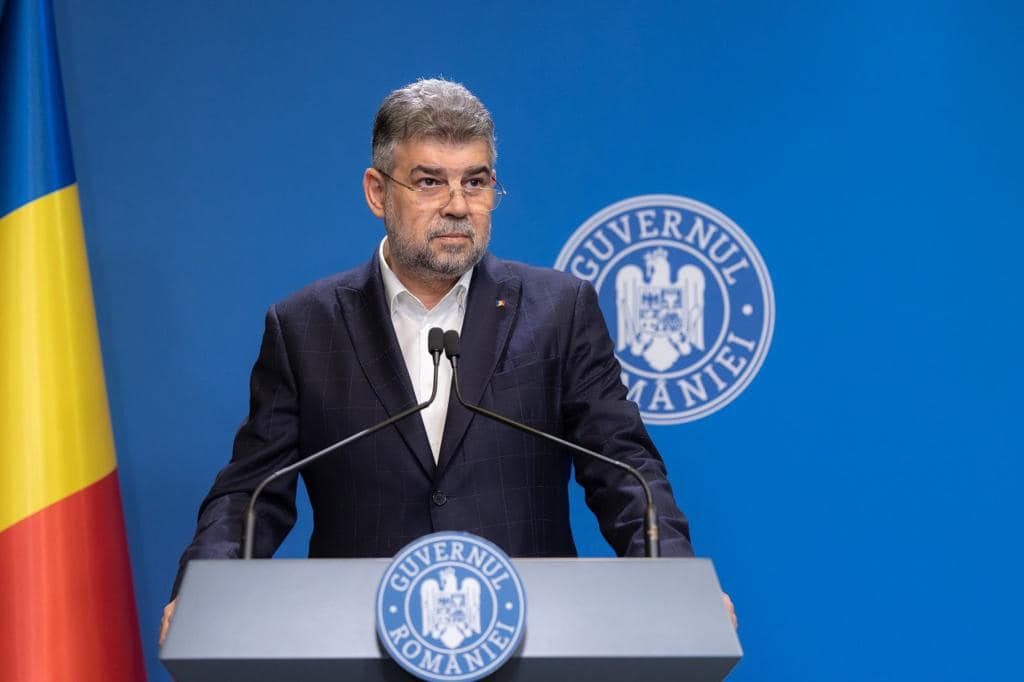
In an interview on Nov. 23 with Europa FM, Romanian Prime Minister Marcel Ciolacu, responding to a question regarding the recent European Court of Human Rights ruling that his nation was in violation of Article 8 of the European Convention on Human Rights over the issue of same-sex marriages, said that it was his belief that his fellow citizens generally are not ready to uphold the rights of same-sex couples.
The ECHR ruled this past May Romania had failed to enforce the rights of same-sex couples by refusing to recognize their relationships, in a ruling which could eventually force policymakers to expand protections for the LGBTQ community, Reuters reported.
Ciolacu, who is the leader of the Social Democratic Party, told Europa FM that “… the Romanian society is not ready for a decision at the moment. It is not one of my priorities and … I don’t think Romania is ready.”
“I am not a closed-minded person, I … have friends in relationships with a man, I don’t have a problem with that, I am talking now from the point of view of a prime minister.”
ACCEPT, the non-governmental organization in Romania that defends and promotes LGBTQ rights, disagreed with the prime minister’s assessment of the mood of the country regarding LGBTQ rights. In a statement the NGO said:
“Romanian society has embraced European values regarding human rights and demonstrates that it is ready for the adoption and implementation of a set of laws to ensure the protection and legal recognition of LGBTI families. After the sociological research carried out by Accept in 2021, a new study comes to confirm this fact.
The results of the research carried out by the Ipsos initiative in 2023 show that 51 percent of Romanians would support some form of legal recognition of LGBTI families. Moreover, the Bucharest Pride March brought over 25,000 participants to the streets this year — a record number for Romania. The figures that place the march at the top of the street protests with the highest participation in our country are telling when it comes to the solidarity and empathy with which Romanians position themselves in favor of the protection and recognition of all families.”
The government of Romania has filed an appeal of the ECHR ruling, which ACCEPT denounced saying it was “completely reprehensible the Romanian government’s action to contest this ECHR decision.”
The Vatican

Awaiting Pope Francis after he finished his Sunday Angelus last week, guests gathered in the Paul VI Hall for a luncheon made up of the poor and their companions including a group of trans women, who all had a history of personally interacting the pontiff.
More than 1,200 people in all came for the lunch that transformed the hall into a large and unique restaurant for the customary annual lunch with Francis on the World Day of the Poor.
PinkNewsUK reported that the pontiff had invited the transgender women in order to offer them comfort and support, and ensured they received VIP treatment. In fact one of them, Claudia Vittoria Salas, a former sex worker, was seated at the table with Francis himself. Salas, who is a godparent to three of her nieces and nephews in her home country, Argentina, said she did sex work in order to put her children through school.
She told the Associated Press: “Being a godparent is a big responsibility; it’s taking the place of the mother or father. It’s not a game.”
Francis began the lunch with a blessing when he thanked the Lord for this “moment of friendship, all together,” for the meal, and for those who prepared it. The tables adorned with white and yellow flowers offered a colourful backdrop for images capturing an unforgettable moment of welcome, concern, care and love for all those who for the rest of the year live on the streets.
The Dicastery for the Service of Charity organized the event, while Hilton Hotels offered the lunch, dedicating special attention to the menu so that the meal could be enjoyed by people of various faith backgrounds present.
On the menu were cannelloni with Roman ricotta and spinach with a Parmigiano Reggiano sauce, sautéed white meatballs with a velouté of San Marzano tomatoes and basil with a cauliflower purée, followed by Tiramisu and small pastry desserts.”
Ireland

A 13-year-old trans teen from the east of Ireland, from the city of Wicklow located south of Dublin on the Irish Sea, was a keynote speaker at the 2023 Child Talks conference.
Bee Fennell, was one of six youth speakers at the Child Talks conference held at Dublin’s Helix Center for the Performing Arts, addressing the need for further education programs regarding to transgender issues facing Irish youth.
GCN, Ireland’s largest LGBTQ media outlet reported:
Among other issues discussed at the event, including STEM programs for girls and vaping, LGBTQ issues emerged as a serious concern for school-aged children through the country. Fennell used their time on stage at the Child Talks conference to discuss their experience coming out as a trans teen and the lack of resources available for trans youth in Wicklow.
“I wanted to take part in Child Talks 2023 because I wanted to share my story and hopefully encourage others to get the education to be a true ally to the community and to understand what it is like to be transgender,” said Fennell.
During their time on stage, Fennell described how they came out to their family and their school: “I was 12 when I officially came out to my parents and only a few months later, to the primary school that I was attending.”
“Coming out to my school was the biggest step, because it meant everyone knew, it wasn’t just in the house anymore. I remember that night so clearly, mam and I, sitting on the couch, typing an email that was going to change my life.
I talked about my name and gender change and explained what it meant. That email was sent around 7 p.m., outside school hours. We received a response 3.5 hours later, at 10:30 that night.”
Fennell, who uses they/them pronouns, went on to explain how their school set up a meeting to help the then 12-year-old come out to their classmates: “After a terrifying but amazing meeting with my school to discuss next steps, the day came when the teacher would tell the class about who I really was.
Me and two friends I had already come out to went to a separate room to avoid any negative reactions. After the most anxiety-filled half-hour of my life, I was walking up the steps to where my class awaited my arrival. A few friends immediately hugged and congratulated me.”
Unfortunately, as Fennell noted, not everyone’s reaction was so kind.
“Some others just stared. Shocked, confused, some even with disgusted impressions,” they said.
Thankfully, however, the vast majority of Fennell’s classmates were accepting and welcoming, leading the trans teen to report that “At that moment … I was more comfortable in my identity than I have ever been before. I was officially Bee, officially me.”
Bee went on to explain how the LGBTQ organization, BelongTo youth services, helped them discover the community that they’ve always been looking for.
“I had been alone in that fight until I walked into that [BelongTo] youth group. I always knew there was community, sure, it’s in the name. But I didn’t have anyone in my position, having gone through it. I didn’t have anyone who didn’t get confused when I simply introduced myself until I walked into that group,” Fennell concluded.
United Kingdom

An independent Regulatory Commission has imposed an action plan and significant fine on the Luton Town Football Club for misconduct in relation to crowd control at their game against Brighton and Hove Albion in the Premier League match that was held on Aug. 12.
The Football Association based at Wembley Stadium in London announced that the club has been fined £120,000 ($151,212) after homophobic chanting from fans took place during an away match against Brighton and Hove Albion.
According to the governing body, Luton Town admitted that they “failed to ensure their spectators and/or supporters (and anyone purporting to be supporters or followers) conduct themselves in an orderly fashion; and do not use words or otherwise behave in a way which is improper, offensive, abusive, indecent or insulting with either express or implied reference to sexual orientation.”
In an interview with the local newspaper, Luton Today, a spokesperson for the team said:
“As an inclusive, family-oriented club, Luton Town abhors abusive chanting such as this and has a zero-tolerance policy towards discrimination of all kinds. It is not acceptable towards anyone in football or wider society, either in person or online. Those involved were committing a criminal offense and anyone subsequently identified will be issued with a club ban and face potential police investigation.”
The club went on to note that it was working with supporters to help form the Rainbow Hatters supporters’ group for members of the LGBTQ community, who meet regularly to share their experiences of watching the Hatters.
“We will continue to promote the ‘Love Football. Protect The Game’ campaign, which this season has focused especially on fan behavior, and will work further with supporter groups to educate and inform on all forms of discriminatory acts to ensure that watching Luton Town is a safe and welcoming experience for everyone,” the club told Luton Today.
Russia
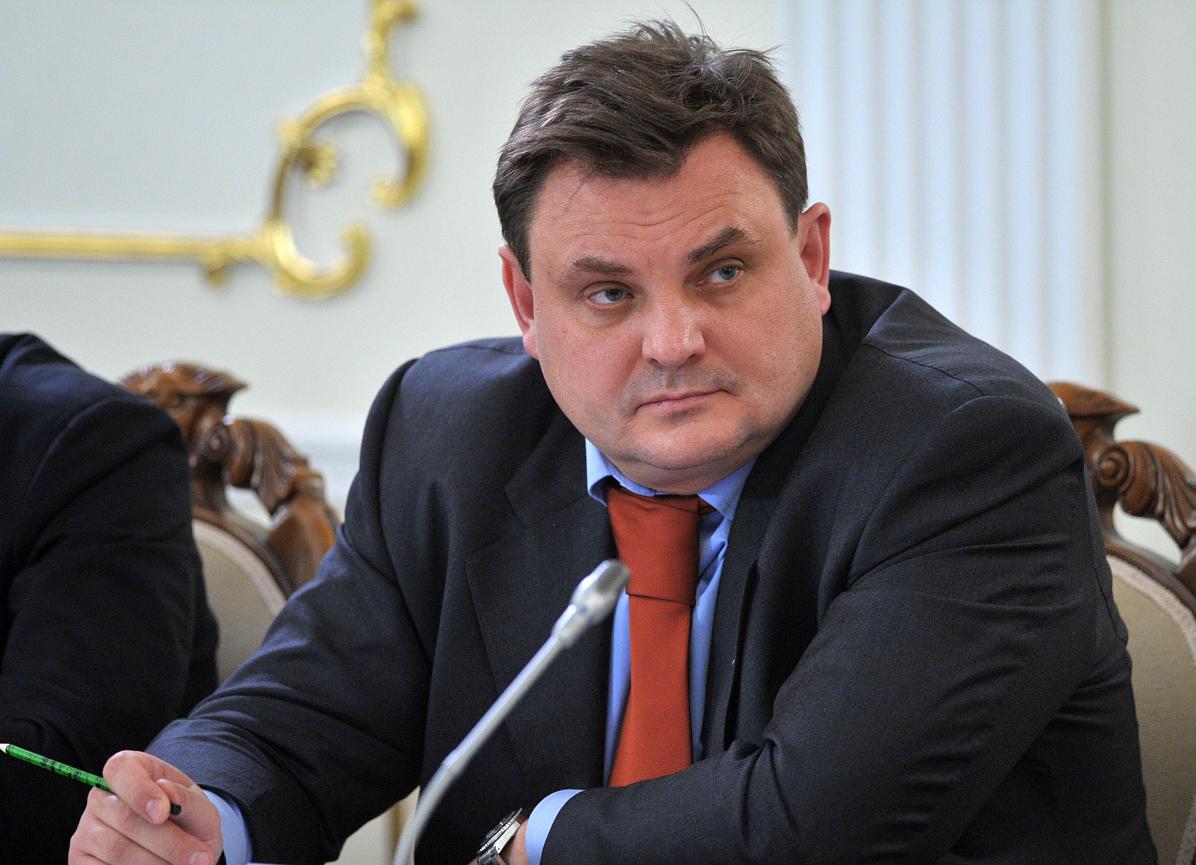
The Russian Justice Ministry has lodged an administrative legal claim with the Russian Supreme Court to recognize the global LGBTQ rights movement as extremist and ban its activity in Russia.
In a Justice Department press release, LGBTQ Russians were referred to as an “international social movement” by the Justice Minister Konstantin Chuychenko.
The ministry did not specify whether it was seeking the closure of any specific groups or organizations, or if the designation would apply more broadly to the LGBTQ community, causes and individuals, Agence France-Presse reported.
This latest action by the Russian government follows nearly 10 years of the Parliament, comprised of the State Duma, which is the lower house, and the Federation Council, which is the upper house, passing legislation attacking its LGBTQ citizens. In July of this year legislation that will effectively ban the existence of trans Russians was signed into law by President Vladimir Putin.
The law now bans Russians from changing their gender on official government identity documents including internal and external passports, driver’s licenses and birth certificates, although gender marker changes had been legal for 26 years since 1997.
Medical healthcare providers are now banned from “performing medical interventions designed to change the sex of a person,” including surgery and prescribing hormone therapy.
In December 2022, Prime Minister Mikhail Mishustin issued a decree on Christmas Eve expanding and amending Russia’s “gay propaganda” law signed by Putin. That law set fines for books or media that represented non-straight relationships.
The Justice Ministry in its statement accused the “LGBTQ movement operating on the territory of the Russian Federation” of “various signs and manifestations of extremism, including incitement to social and religious hatred.” If the court upholds the ban as passed, prosecutors will have the power to pursue “terrorism” cases against LGBTQ Russians, especially activists.
Speaking with Agence France-Presse, the head of the Sphere human rights group, which advocates for the Russian LGBTQ community, criticized the announcement.
“Russian authorities are once again forgetting that the LGBTQ+ community are human beings,” said Sphere head Dilya Gafurova, who has left Russia.
Authorities “don’t just want to erase us from the public field: They want to ban us as a social group,” Gafurova told AFP. “It’s a pretty typical move for repressive non-democratic regimes — the persecution of the most vulnerable. We will continue our fight,” he added.
The Supreme Court’s ruling is scheduled for Nov. 30.
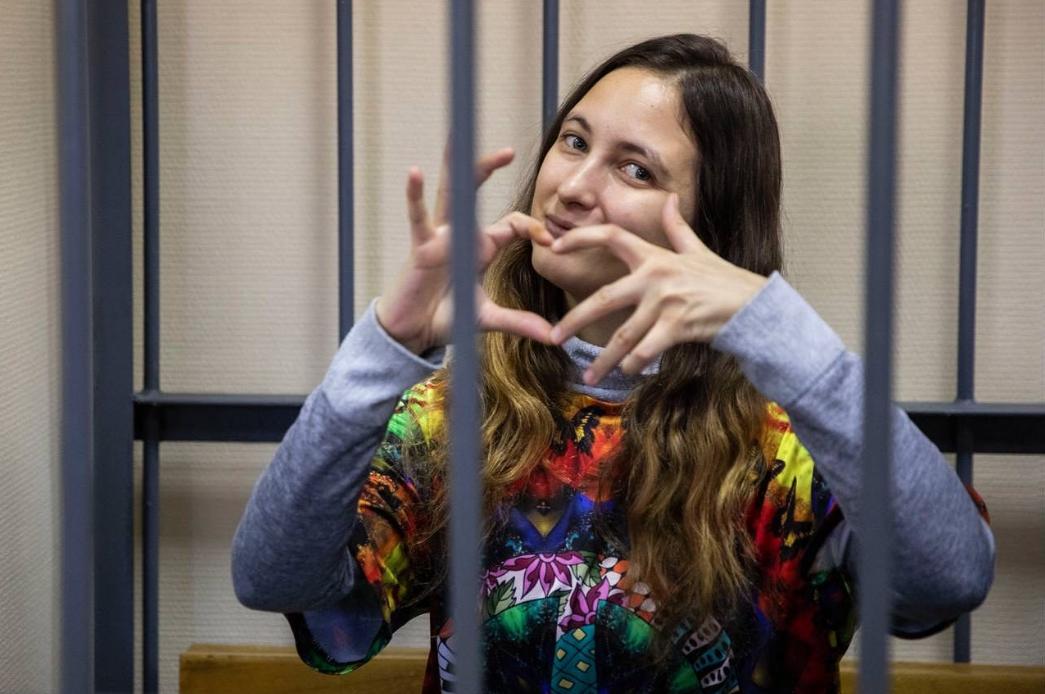
A 33-year-old lesbian artist was sentenced by a Russian court to a term of seven years in a penal camp, after she was convicted of spreading disinformation about the Russian army.
Alexandra Skochilenko, who goes by Sasha, swapped supermarket price tags with slogans criticizing Putin’s war against Ukraine. An elderly shopper reported the swapped tags to the police.
Skochilenko is just the latest among thousands of Russians who have been detained, jailed or fined for speaking out against Putin’s large-scale military operation in Ukraine that has cost the lives of tens of thousands Russian, Ukrainian troops and civilians.
Her supporters in the courtroom shouted “shame” and “we’re with you Sasha” after the judge Oksana Demiasheva read out the verdict, an AFP journalist at the sentencing reported. Skochilenko wore a colorful T-shirt with a large red heart printed on it, and she made a heart shape with her hands and smiled to supporters during the hearing.
Addressing Demiasheva, Skochilenko said:
“Your Honor! Every court sentence is a certain message to the public. You may think of this information differently than my lawyers or I do, but you will agree that I have my moral principles and that I haven’t departed from them, not by an inch. You will probably agree that I have shown courage, resilience and fearlessness. In the slang of investigators, to put someone in jail is ‘to take them prisoner.’
And I have not given up under threats of being taken prisoner, of bullying, illness and the 8-year sentence that prosecution has asked for; I have not been hypocritical; I have been honest before myself and before the court.
If you choose to convict me, what message will you send to our fellow citizens? That you have to break if you’re taken prisoner? That you have to lie, be a hypocrite, change your convictions if you face some pressure? That you can’t have pity for our soldiers? That you can’t wish for peaceful skies above our heads? Is it really what you want to say to people in times of depression, instability, crisis, and stress?
My process is widely covered in Russia and in the world; news videos and documentary films are being made, and even books are being written about it. So regardless of the verdict you deliver, you will become part of history. Perhaps you will become part of history as the person who convicted me; perhaps as the person who acquitted me; perhaps as the person who made a neutral decision and gave me a fine, a conditional sentence, or a time that I have already served. It is all in your hands, but remember: Everybody knows, everybody sees that you’re not trying a terrorist in this court. You’re not trying an extremist. You’re not even trying a political activist. You’re trying a musician, an artist and a pacifist.”
“Every person in this room wants only one thing: Peace. Why fight?” she added in her closing statement.
According to the Russian language media outlet Mediazona, federal prosecutor Alexander Gladyshev told the court: “Skochilenko compares the Russian Federation with a fascist state, they [prosecution expert witnesses] explained that in the Russian Federation now there are no elements of a fascist state. The words that Russia attacked Ukraine are false; the purpose of the SVO [special military operation] was to protect the citizens of Donbas from aggression,” Gladyshev said.
Skochilenko’s mother says her daughter suffers from health issues, including celiac disease and a congenital heart defect, adding that a long prison term would be a “catastrophe.”
India
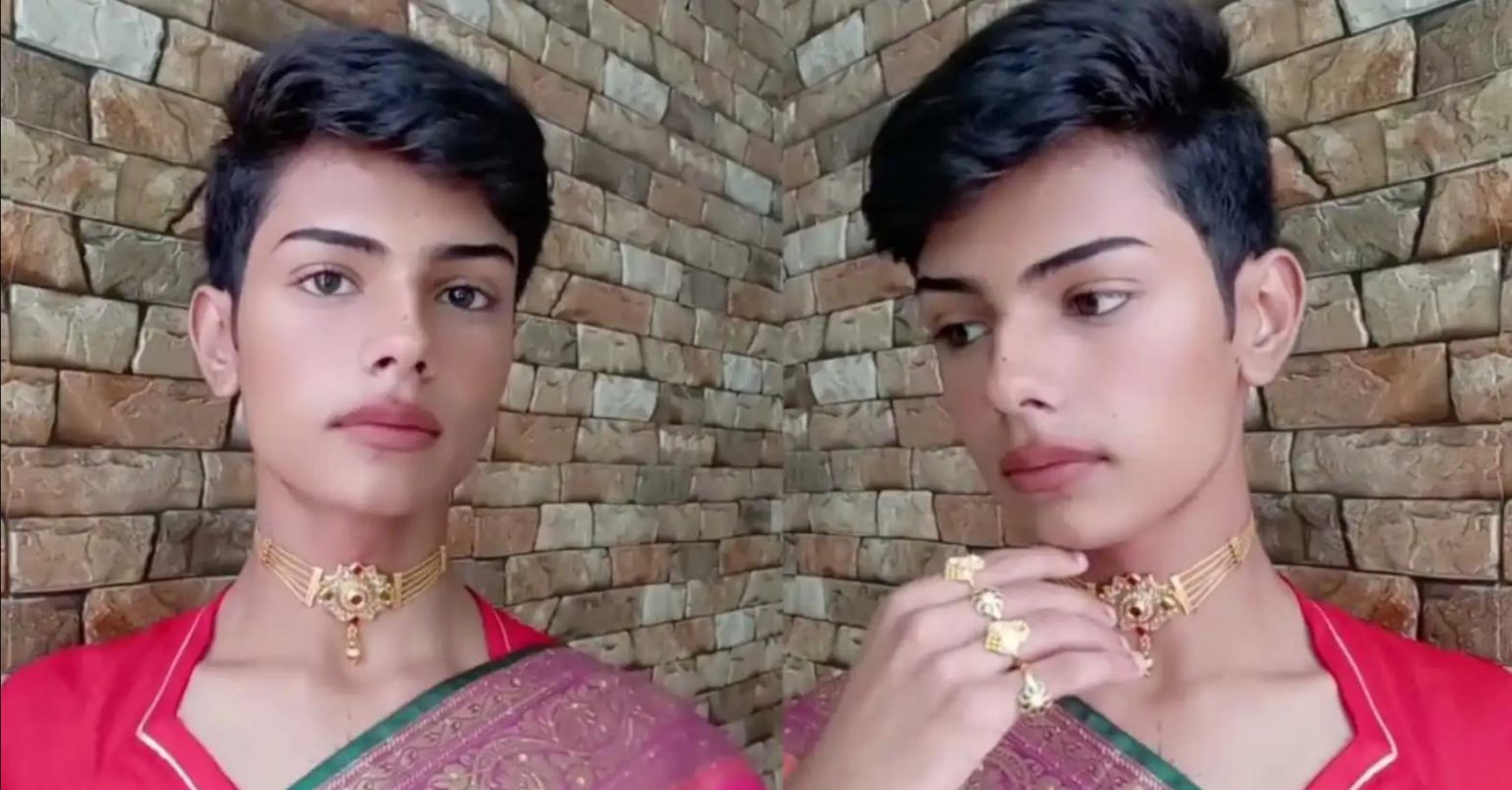
The death of a queer teenager by suicide in the ancient city of Ujjain beside the Kshipra River in the central Indian state of Madhya Pradesh has LGBTQ advocacy groups calling on social media giant Meta to address what one group, Yes, We Exist, to label as “mass bullying on Instagram.
According to the local media outlet Ujjain News, Pranshu Yadav, 16, whose Instagram account has 14,000 followers and more than 300 posts was found hanging in their bedroom on Nov. 21 by their mother who rushed the adolescent to hospital where they later died. Local police are now investigating.
Yes, We Exist highlighted how Yadav, who was attempting to build a career as a professional makeup artist, received more than 4,000 comments on a current Instagram reel, many of which were homophobic.
In the reel they were attacked for wearing a saree in a reel they posted celebrating Diwali, the Hindu festival of lights earlier this month. A saree (also spelled sari) is a an outer garment, mainly worn by women from the Indian subcontinent, that is made of about six yards long fabric. A saree, worn with a blouse or choli, is wrapped around the waist over a petticoat with the left end made to hang over the head or shoulder. A saree comes in various types of fabric, color, design and styles.
In India’s culture of toxic masculinity where LGBTQ people are still ill regarded and full equality is years away, the reaction to the queer teen’s Instagram post was almost predictable an India activist told the Washington Blade via a Telegram exchange.
Yes, We Exist now calling on Instagram, which is owned by Meta, to invest in its non-English languages and ensure cyber bullying is tackled.
“We have ourselves reported queerphobic content several times and most often no action is taken. On the contrary, when people call out bullies, they get penalized by Meta,” Jeet, the founder of Yes, We Exist, told PinkNewsUK.
Jeet added that the “tragic loss” Pranshu it is a “devastating reminder of the real-world consequences of online bullying.”
“The LGBTQIA+ community in India mourns not only the individual but also the systemic challenges we routinely face.
The call for greater accountability from platforms like Instagram and from Indian lawmakers who have not prioritized offline and online safety of our community, is urgent to ensure the well-being of young queer individuals like Pranshu.”
Thailand
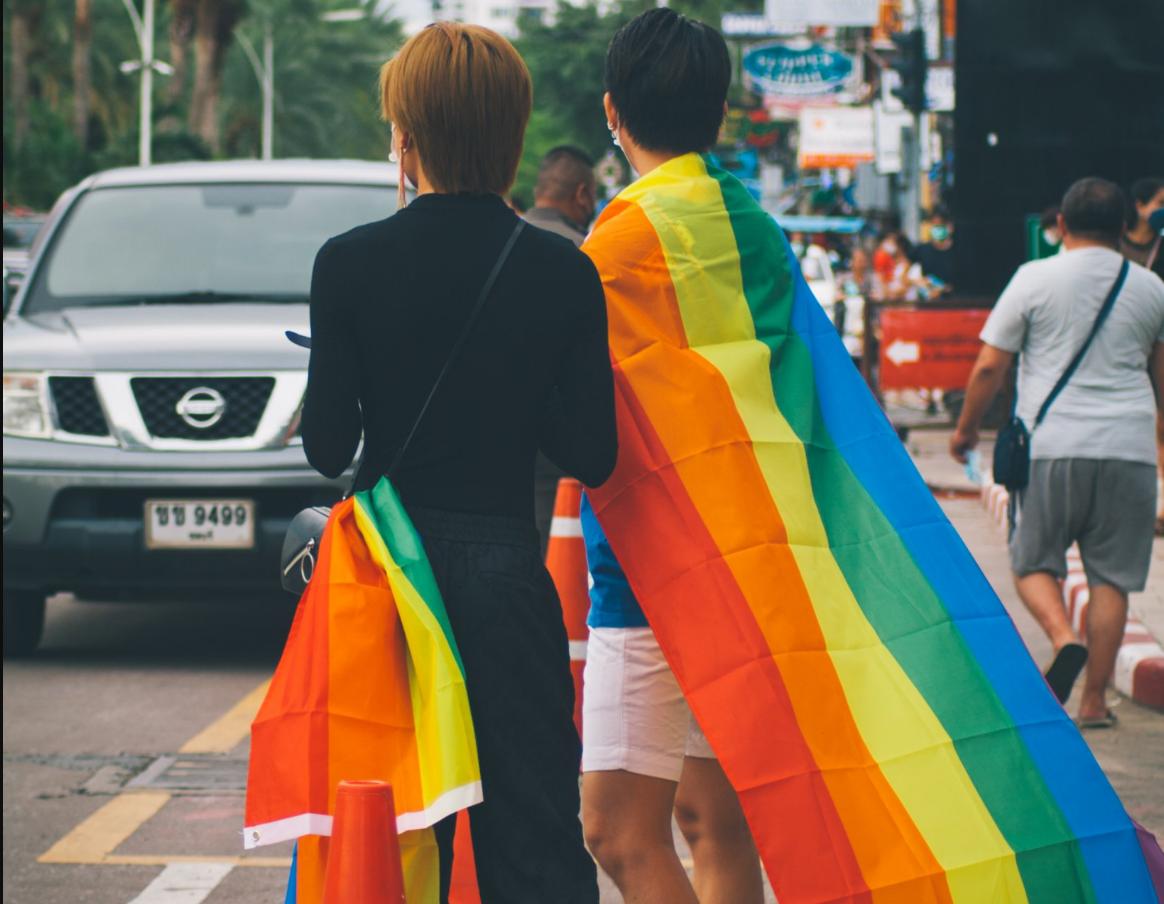
The Thailand Cabinet approved an amendment to the country’s civil code to allow same-sex marriage, with an expectation for the draft to be submitted to the National Assembly in December, the Associated Press reported.
Deputy government spokesman Karom Polpornklang said the amendment bill proposed by the Justice Ministry seeks to allow same-sex marriage with full legal rights. It will also allow members of the LGBTQ community to build families and ensure both spouses have equal rights.
Karom said the bill’s main principle is to remove the terms “men,” “women,” “wives” and “husbands” from the civil code.
The terms will be changed to “persons,” “fiancées,” “engaged couples” and “married couples,” so men can marry men and women can marry women and have the same rights as male-female unions.
The deputy spokesman said the Cabinet has also called on the Council of State to amend other laws accordingly, so the surviving spouse in a same-sex marriage is entitled to receive the inheritance left behind by their partner.
The Council of State has also been tasked with scrutinizing the same-sex marriage bill, and once that is done it will be submitted to the House, Karom said.
Thai government spokesman Chai Wacharonke said the amendment bill would be different from the Life Partnership Act that was enacted by the last government.
He said this act simply endorses the rights for same-sex couples to spend their lives together but does not provide full legal marital rights.
Additional reporting from Europa FM, PinkNewsUK, The Associated Press, Vatican Press, Mediazona, Agence France-Presse, Luton Today, GCN Ireland and Ujjain News.
Books
New book profiles LGBTQ Ukrainians, documents war experiences
Tuesday marks four years since Russia attacked Ukraine

Journalist J. Lester Feder’s new book profiles LGBTQ Ukrainians and their experiences during Russia’s war against their country.
Feder for “The Queer Face of War: Portraits and Stories from Ukraine” interviewed and photographed LGBTQ Ukrainians in Kyiv, the country’s capital, and in other cities. They include Olena Hloba, the co-founder of Tergo, a support group for parents and friends of LGBTQ Ukrainians, who fled her home in the Kyiv suburb of Bucha shortly after Russia launched its war on Feb. 24, 2022.
Russian soldiers killed civilians as they withdrew from Bucha. Videos and photographs that emerged from the Kyiv suburb showed dead bodies with their hands tied behind their back and other signs of torture.

Olena Shevchenko, chair of Insight, a Ukrainian LGBTQ rights group, wrote the book’s forward.

The book also profiles Viktor Pylypenko, a gay man who the Ukrainian military assigned to the 72nd Mechanized Black Cossack Brigade after the war began. Feder writes Pylypenko’s unit “was deployed to some of the fiercest and most important battles of the war.”
“The brigade was pivotal to beating Russian forces back from Kyiv in their initial attempt to take the capital, helping them liberate territory near Kharkiv and defending the front lines in Donbas,” wrote Feder.
Pylypenko spent two years fighting “on Ukraine’s most dangerous battlefields, serving primarily as a medic.”
“At times he felt he was living in a horror movie, watching tank shells tear his fellow soldiers apart before his eyes,” wrote Feder. “He held many men as they took their final breaths. Of the roughly one hundred who entered the unit with him, only six remained when he was discharged in 2024. He didn’t leave by choice: he went home to take care of his father, who had suffered a stroke.”
Feder notes one of Pylypenko’s former commanders attacked him online when he came out. Pylypenko said another commander defended him.
Feder also profiled Diana and Oleksii Polukhin, two residents of Kherson, a port city in southern Ukraine that is near the mouth of the Dnieper River.
Ukrainian forces regained control of Kherson in November 2022, nine months after Russia occupied it.
Diana, a cigarette vender, and Polukhin told Feder that Russian forces demanded they disclose the names of other LGBTQ Ukrainians in Kherson. Russian forces also tortured Diana and Polukhin while in their custody.
Polukhim is the first LGBTQ victim of Russian persecution to report their case to Ukrainian prosecutors.

Feder, who is of Ukrainian descent, first visited Ukraine in 2013 when he wrote for BuzzFeed.
He was Outright International’s Senior Fellow for Emergency Research from 2021-2023. Feder last traveled to Ukraine in December 2024.
Feder spoke about his book at Politics and Prose at the Wharf in Southwest D.C. on Feb. 6. The Washington Blade spoke with Feder on Feb. 20.
Feder told the Blade he began to work on the book when he was at Outright International and working with humanitarian groups on how to better serve LGBTQ Ukrainians. Feder said military service requirements, a lack of access to hormone therapy and documents that accurately reflect a person’s gender identity and LGBTQ-friendly shelters are among the myriad challenges that LGBTQ Ukrainians have faced since the war began.
“All of these were components of a queer experience of war that was not well documented, and we had never seen in one place, especially with photos,” he told the Blade. “I felt really called to do that, not only because of what was happening in Ukraine, but also as a way to bring to the surface issues that we’d had seen in Iraq and Syria and Afghanistan.”

Feder also spoke with the Blade about the war’s geopolitical implications.
Russian President Vladimir Putin in 2013 signed a law that bans the “promotion of homosexuality” to minors.
The 2014 Winter Olympics took place in Sochi, a Russian resort city on the Black Sea. Russia annexed Crimea from Ukraine a few weeks after the games ended.
Russia’s anti-LGBTQ crackdown has continued over the last decade.
The Russian Supreme Court in 2023 ruled the “international LGBT movement” is an extremist organization and banned it. The Russian Justice Ministry last month designated ILGA World, a global LGBTQ and intersex rights group, as an “undesirable” organization.
Ukraine, meanwhile, has sought to align itself with Europe.
Ukrainian President Volodymyr Zelenskyy after a 2021 meeting with then-President Joe Biden at the White House said his country would continue to fight discrimination based on sexual orientation and gender identity. (Zelenskyy’s relationship with the U.S. has grown more tense since the Trump-Vance administration took office.) Zelenskyy in 2022 publicly backed civil partnerships for same-sex couples.
Then-Ukrainian Ambassador to the U.S. Oksana Markarova in 2023 applauded Kyiv Pride and other LGBTQ and intersex rights groups in her country when she spoke at a photo exhibit at Ukraine House in D.C. that highlighted LGBTQ and intersex soldiers. Then-Kyiv Pride Executive Director Lenny Emson, who Feder profiles in his book, was among those who attended the event.
“Thank you for everything you do in Kyiv, and thank you for everything that you do in order to fight the discrimination that still is somewhere in Ukraine,” said Markarova. “Not everything is perfect yet, but you know, I think we are moving in the right direction. And we together will not only fight the external enemy, but also will see equality.”
Feder in response to the Blade’s question about why he decided to write his book said he “didn’t feel” the “significance of Russia’s war against Ukraine” for LGBTQ people around the world “was fully understood.”
“This was an opportunity to tell that big story,” he said.
“The crackdown on LGBT rights inside Russia was essentially a laboratory for a strategy of attacking democratic values by attacking queer rights and it was one as Ukraine was getting closet to Europe back in 2013, 2014,” he added. “It was a strategy they were using as part of their foreign policy, and it was one they were using not only in Ukraine over the past decade, but around the world.”
Feder said Republicans are using “that same strategy to attack queer people, to attack democracy itself.”
“I felt like it was important that Americans understand that history,” he said.
Netherlands
Rob Jetten becomes first gay Dutch prime minister
38-year-old head of government sworn in on Monday

Rob Jetten on Monday became the Netherland’s first openly gay prime minister.
Jetten’s centrist D66 party won the country’s elections last October, narrowly defeating Geert Wilders’ far-right Party for Freedom.
King Willem-Alexander on Monday swore in Jetten, who is also the country’s youngest-ever prime minister. The Associated Press notes Jetten’s coalition government includes the center-right Christian Democrats and the center-right People’s Party for Freedom and Democracy.
“Proud to be able to do this together,” said Jetten in an X post before Willem-Alexander swore him in.
COC Nederland, a Dutch LGBTQ advocacy group, in a statement said Jetten “becoming prime minister shows that your sexual orientation doesn’t have to matter.”
“You can become a construction worker, a doctor, a lawyer, and even prime minister,” said COC Nederland.
The advocacy group noted Jetten has said his government will implement its “Rainbow Agreement” that include calls for strengthening nondiscrimination laws “to better protect transgender and intersex people,” appointing more “discrimination investigators … to address violence against LGBTQ+ people and other minorities,” and introducing measures “to promote acceptance in schools.”
“COC will hold the Cabinet to that promise,” said COC Nederland.
Jetten’s fiancé is Nicolás Keenen, an Argentine field hockey player who competed in the 2024 Summer Olympics in Paris.
Jetten is one of two openly gay heads of government: Andorran Prime Minister Xavier Espot Zamora came out in 2023. Gay Latvian President Edgars Rinkēvičs, who is the country’s head of state, took office in 2023.
Leo Varadkar, who was Ireland’s prime minister from 2017-2020 and from 2022-2024, and Xavier Bettel, who was Luxembourg’s prime minister from 2013-2023, are gay. Ana Brnabić, who was Serbia’s prime minister from 2017-2024, is a lesbian.
Former Icelandic Prime Minister Jóhanna Sigurðardóttir in 2009 became the world’s first openly lesbian head of government. Former Belgian Prime Minister Elio Di Rupo, former San Marino Captain Regent Paolo Rondelli, and former French Prime Minister Gabriel Attal are also openly gay.
Colombian presidential candidate Claudia López, who is the former mayor of Bogotá, the Colombian capital, would become her country’s first female and first lesbian president if she wins the country’s presidential election that is taking place later this year.
Ecuador
Justicia reconoce delito de odio en caso de bullying en Instituto Nacional Mejía de Ecuador
Johana B se suicidó el 11 de abril de 2023

A casi tres años del suicidio de Johana B., quien estudió en el Instituto Nacional Mejía, colegio emblemático de Quito, el Tribunal de la Corte Nacional de Justicia ratificó la condena para el alumno responsable del acoso escolar que la llevó a quitarse la vida.
Según información de la Fiscalía, el fallo de última instancia deja en firme la condena de cuatro años de internamiento en un centro para adolescentes infractores, en una audiencia de casación pedida por la defensa del agresor, tres meses antes de que prescriba el caso.
Con la sentencia, este caso es uno de los primeros en el país en reconocer actos de odio por violencia de género, delito tipificado en el artículo 177 del Código Orgánico Penal Integral (COIP).
El suicidio de Johana B. ocurrió el 11 abril de 2023 y fue consecuencia del acoso escolar por estereotipos de género que enfrentó la estudiante por parte de su agresor, quien constantemente la insultaba y agredía por su forma de vestir, llevar el cabello corto o practicar actividades que hace años se consideraban exclusivamente para hombres, como ser mando de la Banda de Paz en el Instituto Nacional Mejía.
Desde la muerte de Johana, su familia buscaba justicia. Su padre, José, en una entrevista concedida a edición cientonce para la investigación periodística Los suicidios que quedan en el clóset a causa de la omisión estatal afirmó que su hija era acosada por su compañero y otres estudiantes con apodos como “marimacha”, lo que también fue corroborado en los testimonios recogidos por la Unidad de Justicia Juvenil No. 4 de la Fiscalía.
Los resultados de la autopsia psicológica y del examen antropológico realizados tras la muerte de Johana confirmaron las versiones de sus compañeras y docentes: que su agresor la acosó de manera sistemática durante dos años. Los empujones, jalones de cabello o burlas, incluso por su situación económica, eran constantes en el aula de clase.
La violencia que recibió Johana escaló cuando su compañero le dio un codazo en la espalda ocasionándole una lesión que le imposibilitó caminar y asistir a clases.
Días después del hecho, la adolescente se quitó la vida en su casa, tras escuchar que la madre del agresor se negó a pagar la mitad del valor de una tomografía para determinar la lesión en su espalda, tal como lo había acordado previamente con sus padres y frente al personal del DECE (Departamento de Consejería Estudiantil del colegio), según versiones de su familia y la Fiscalía.
#AFONDO | Johana se suicidó el 11 de abril de 2023, tras ser víctima de acoso escolar por no cumplir con estereotipos femeninos 😢.
Dos semanas antes, uno de sus compañeros le dio un codazo en la espalda, ocasionándole una lesión que le imposibilitó caminar 🧵 pic.twitter.com/bXKUs9YYOm
— EdicionCientonce (@EdCientonce) September 3, 2025
“Era una chica linda, fuerte, alegre. Siempre nos llevamos muy bien, hemos compartido todo. Nos dejó muchos recuerdos y todos nos sentimos tristes; siempre estamos pensando en ella. Es un vacío tan grande aquí, en este lugar”, expresó José a Edición Cientonce el año pasado.
Para la fiscal del caso y de la Unidad de Justicia Juvenil de la Fiscalía, Martha Reino, el suicidio de la adolescente fue un agravante que se contempló durante la audiencia de juzgamiento de marzo de 2024, según explicó a este medio el año pasado. Desde entonces, la familia del agresor presentó un recurso de casación en la Corte Nacional de Justicia, que provocó la dilatación del proceso.
En el fallo de última instancia, el Tribunal también dispuso que el agresor pague $3.000 a la familia de Johana B. como reparación integral. Además, el adolescente deberá recibir medidas socioeducativas, de acuerdo al artículo 385 del Código Orgánico de la Niñez y Adolescencia, señala la Fiscalía.
El caso de Johana también destapó las omisiones y negligencias del personal del DECE y docentes del Instituto Nacional Mejía. En la etapa de instrucción fiscal se comprobó que no se aplicaron los protocolos respectivos para proteger a la víctima.
De hecho, la Fiscalía conoció el caso a raíz de la denuncia que presentó su padre, José, y no por el DECE, aseguró la fiscal el año pasado a Edición Cientonce.
Pese a estas omisiones presentadas en el proceso, el fallo de última instancia sólo ratificó la condena para el estudiante.


















